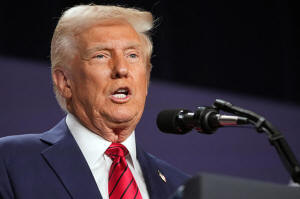Trump makes moves to expand his power, sparking chaos and a possible
constitutional crisis
 Send a link to a friend
Send a link to a friend
 [January 29, 2025]
By NICHOLAS RICCARDI [January 29, 2025]
By NICHOLAS RICCARDI
Just a little over a week into his second term, President Donald Trump
is taking steps to maximize his power, sparking chaos and what critics
contend is a constitutional crisis as he challenges the separation of
powers that have defined American government for more than 200 years.
The new administration's most provocative move came this week, as it
announced it would temporarily halt federal payments to ensure they
complied with Trump's orders barring diversity programs. The
technical-sounding directive had enormous immediate impact before it was
blocked by a federal judge, potentially pulling trillions of dollars
from police departments, domestic violence shelters, nutrition services
and disaster relief programs that rely on federal grants.
Though the Republican administration denied Medicaid was affected, it
acknowledged the online portal allowing states to file for reimbursement
from the program was shut down for part of Tuesday in what it insisted
was an error.
Legal experts noted the president is explicitly forbidden from cutting
off spending for programs that Congress has approved. The U.S.
Constitution grants Congress the power to appropriate money and requires
the executive to pay it out. A 50-year-old law known as the Impoundment
Control Act makes that explicit by prohibiting the president from
halting payments on grants or other programs approved by Congress.
“The thing that prevents the president from being an absolute monarch is
Congress controls the power of the purse strings,” said Josh Chafetz, a
law professor at Georgetown University, adding that even a temporary
freeze violates the law. “It's what guarantees there's a check on the
presidency.”
Democrats and other critics said the move was blatantly
unconstitutional.
"What happened last night is the most direct assault on the authority of
Congress, I believe, in the history of the United States,” Sen. Angus
King, an independent from Maine, said Tuesday.
While some Republicans were critical, most were supportive.
“I think he is testing the limits of his power, and I don’t think any of
us are surprised by it,” said Sen. Kevin Cramer, a North Dakota
Republican who is close with Trump.
At first blush, the Trump administration appears to be following the
correct procedures in identifying potential spending cuts, and the
Impoundment Control Act outlines a procedure for how they could become
permanent, said Rachel Snyderman, a former official at the Office of
Management and Budget who is now at the Bipartisan Policy Center.
Congress must eventually sign off on any cuts the administration wants
to make, Snyderman said, though she noted that no president since Bill
Clinton, a Democrat, has been successful in getting that done. Congress
did not act on $14 billion in impoundment cuts Trump proposed during his
prior term, she said.

“We have to see what the next steps are,” Snyderman said.
The proposed halt on grants comes after Trump, who during the campaign
pledged to be “a dictator on day one,” has taken a number of provocative
moves to challenge legal constraints on his power. He fired the
inspectors general of his Cabinet agencies without giving Congress the
warning required by law, declared that there is an immigrant “invasion”
despite low numbers of border crossings, is requiring loyalty pledges
from new hires, challenged the constitutional guarantee of birthright
citizenship and is moving career staff out of key positions at the
Department of Justice to ensure his loyalists control investigations and
prosecutions.
On Tuesday evening, the new administration made its latest move, trying
to prune the federal workforce by offering pay until the end of
September for those who agree to resign by the end of next week.
[to top of second column]
|

President Donald Trump speaks at the 2025 House Republican Members
Conference Dinner at Trump National Doral Miami in Doral, Fla.,
Monday, Jan. 27, 2025. (AP Photo/Mark Schiefelbein)

The Trump actions have all led to a cascade of court challenges
contending he has overstepped his constitutional bounds. A federal
judge in Seattle has already put on hold Trump's attempt to revoke
birthright citizenship, calling it a blatant violation of the
nation's foundational legal document. On Tuesday, nonprofit groups
persuaded a federal judge in Washington to put the administration's
spending freeze order on hold until a fuller hearing on Feb. 3.
Democratic attorneys general also rushed to court to block the
order. New Mexico Attorney General Raul Torrez, a Democrat, said the
swiftness of the court action against Trump's spending freeze
demonstrates the “carelessness” of the order.
“My hope is that the president, working with Congress, can identify
whatever his priorities are and can work through the normal
constitutional order that is well established that limits the power
of Democratic and Republican presidents,” he said.
The grant freeze — administration officials described it as a
“pause” — fits with a long-sought goal of some Trump allies,
including his nominee to run the Office of Management and Budget,
Russell Vought, to challenge the constitutionality of the
Impoundment Control Act. They contend the president, as the person
in charge of distributing funds, should be able to have some control
over how the money goes out.
Though there's little doubt the new administration wanted a court
fight over its power to control spending, experts agree that this
was likely not the way they hoped to present it.
“This is a really sloppy way of doing this,” said Bill Galston, of
the Brookings Institution, adding that he thought it was an
administration error. “This is just classic Trump. He believes it's
better to be fast and sloppy than slow and precise.”
In her first press conference, Trump's new press secretary, Karoline
Leavitt, on Tuesday urged organizations that need the grants to call
the administration and show how their operations are “in line with
the president's agenda.”
“It's incumbent on this administration to make sure, again, that
every penny is accounted for,” Leavitt said.
Republican lawmakers largely took the freeze in stride.
“This isn’t a huge surprise to me," said Rep. Dusty Johnson of South
Dakota during the House Republican retreat at one of the president's
Florida golf resorts. “Clearly, Donald Trump campaigned in no small
part on the idea that the Biden administration was putting out a lot
of money that was not consistent with Donald Trump’s values.”
But Democrats and others were furious at the move, which seemed
designed to undercut congressional authority.
“If President Trump wants to change our nation’s laws, he has the
right to ask Congress to change them,” Sen. Bernie Sanders, an
independent from Vermont, said in a statement. “He does not have the
right to violate the United States Constitution. He is not a king.”
Chafetz, of Georgetown University, said the lack of pushback from
Republican members of Congress was especially alarming because the
legislative branch is the one whose powers are most at risk in the
latest power play.
Even if Trump loses the legal battle, Chafetz said, he and his
followers might feel like they've won by pushing things to this
extreme.
“Damaging the institutions they don't like," he said, “seems to be
their whole theory of governance.”
___
Riccardi reported from Denver. Associated Press writers Kevin
Freking and Lisa Mascaro in Washington and Morgan Lee in
Albuquerque, New Mexico, contributed to this report.
All contents © copyright 2025 Associated Press. All rights reserved |